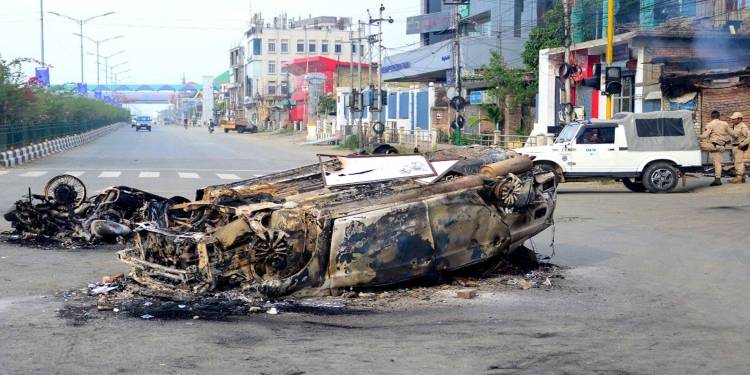
Clashes between rival ethnic groups in Manipur, a remote state in India’s northeast, have reportedly killed more than 50 people in recent days, and the situation remains volatile, even as the authorities rush troops to the area to quell the disorder and seek to control the flow of information, the foreign media reported.
The unrest, which began Wednesday, arose from a dispute over who gets to claim a special tribal status that grants extra privileges. The largest group in the state, slightly over half the population, is seeking that designation for itself.
By Thursday, the violence had reached an extraordinary level, as people set fire to homes and vehicles, churches, and temples. There has been no government confirmation of a death toll widely reported in Indian news outlets as more than 50, though one official, who requested anonymity because he was not authorized to confirm a figure, described it as accurate.
In response, the Indian Army has flown nearly 10,000 troops and paramilitary forces to Manipur, a state of less than 3 million people near the borders with Bangladesh and Myanmar, more than 1,000 miles from New Delhi.
On Friday the state’s governor issued “shoot-at-sight” orders, giving the security forces the authority to fire on mobs “in extreme cases.” It is not clear if they have done so, and if this accounts for any of the 54 dead that Indian news outlets report have been counted at three different hospitals.
An Indian military spokesman said on Friday night that they had secured “firm control” over the most affected districts. But because the authorities have also shut down the internet, imposed a curfew, and canceled trains into the region, it is impossible to say if this is true.
India’s northeast is a patchwork of groups, differing by language and religion, and often at odds with each other and the national government over internal borders and human rights issues.
The recent unrest started with a student group holding a march to protest efforts to reclassify Meiteis, the state’s largest ethnic group, as a “scheduled tribe.” Currently, only the state’s Naga and Kuki peoples, who inhabit the rugged hill country, enjoy this designation, which among other things gives an advantage in securing government jobs.
A group representing the Meiteis had filed a petition for scheduled-tribe status more than 10 years ago. Last month, Manipur’s High Court issued a ruling noting the long delay and giving the state government just four weeks to recommend a plan to the national government.
The unrest, which began Wednesday, arose from a dispute over who gets to claim a special tribal status that grants extra privileges. The largest group in the state, slightly over half the population, is seeking that designation for itself.
By Thursday, the violence had reached an extraordinary level, as people set fire to homes and vehicles, churches, and temples. There has been no government confirmation of a death toll widely reported in Indian news outlets as more than 50, though one official, who requested anonymity because he was not authorized to confirm a figure, described it as accurate.
In response, the Indian Army has flown nearly 10,000 troops and paramilitary forces to Manipur, a state of less than 3 million people near the borders with Bangladesh and Myanmar, more than 1,000 miles from New Delhi.
On Friday the state’s governor issued “shoot-at-sight” orders, giving the security forces the authority to fire on mobs “in extreme cases.” It is not clear if they have done so, and if this accounts for any of the 54 dead that Indian news outlets report have been counted at three different hospitals.
An Indian military spokesman said on Friday night that they had secured “firm control” over the most affected districts. But because the authorities have also shut down the internet, imposed a curfew, and canceled trains into the region, it is impossible to say if this is true.
India’s northeast is a patchwork of groups, differing by language and religion, and often at odds with each other and the national government over internal borders and human rights issues.
The recent unrest started with a student group holding a march to protest efforts to reclassify Meiteis, the state’s largest ethnic group, as a “scheduled tribe.” Currently, only the state’s Naga and Kuki peoples, who inhabit the rugged hill country, enjoy this designation, which among other things gives an advantage in securing government jobs.
A group representing the Meiteis had filed a petition for scheduled-tribe status more than 10 years ago. Last month, Manipur’s High Court issued a ruling noting the long delay and giving the state government just four weeks to recommend a plan to the national government.

